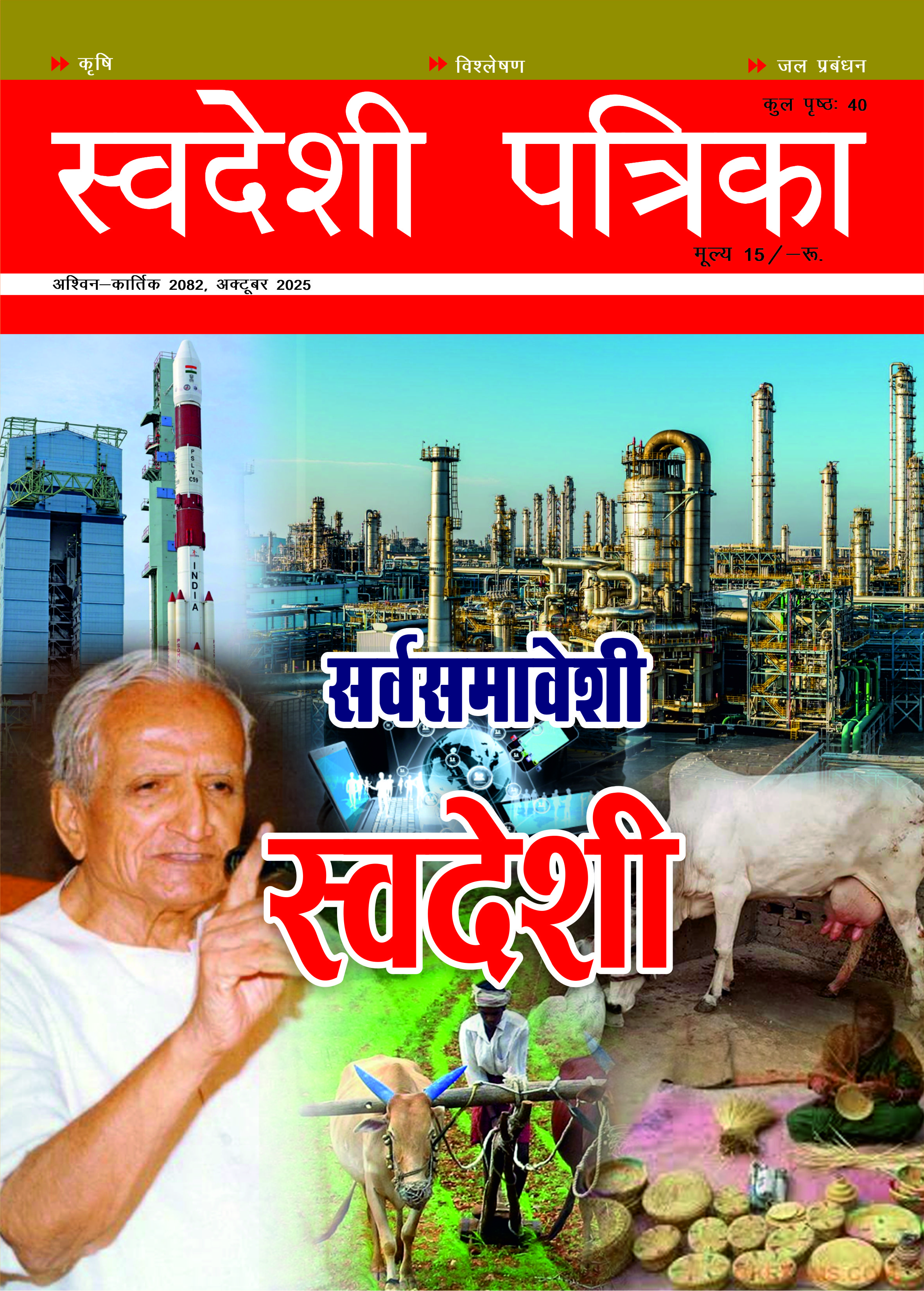
Artificial Intelligence Initiatives
Our AI models under development are more user-friendly and encompass all the needs of the corporate, farmers, start-up ecosystems, education, entrepreneurs and the Government imperatives. — Vinod Johri
In the previous article on DeepSeek, an overview was presented with the insight on the revolution in artificial intelligence. In this article, the emphasis is laid on the artificial intelligence initiatives by our Government.
The market reaction to DeepSeek’s AI breakthroughs has been extreme. DeepSeek’s story teaches us critical truths about technology, innovation and greed. DeepSeek’s success also demonstrates the power of constraints.
From the early days of Silicon Valley where the scrappy start-ups out-manoeuvred the corporate giants to the rise of mobile where hardware limitations spurred software innovation, constraints have always been the catalyst for breakthroughs. The biggest lesson from DeepSeek’s rise is the power of open systems. In an age where AI models are being treated as proprietary IPs, DeepSeek is opposite. By being open source, they are rebalancing the AI equation.
Several of our government departments at the state and central level are planning to deploy artificial intelligence (AI) as they look to get more of efficient, become more responsive to public needs, redress grievances and improve access to welfare programmes among other things. Central and state governments departments have floated as many as 13 projects and are seeking tech partners to implement AI in areas such as conversational chatbots, video analytics and data analytics - projects are valued at Rs. 1 crore to Rs. 10 crores. The Union Power Ministry is building the Jyoti Chatbot to inform urban consumers about connections, outages and billing disputes. Digital India Corporation, a non-profit set up by the Ministry of electronics and information technology (MeitY) is seeking an AI chatbot to power the MyScheme platform with themodels such as Claude, Llama and GPT-40 that will enable citizens to discover and apply for various social welfare and benefit schemes. The Forest Department of Odisha government is looking to deploy AI based video analytics software and that aims to track animal movement and prevent human wildlife conflict.
Union Minister Shri Ashwini Vaishnav said government and its agencies will provide Rs.16,300 crore while public sector entities as Khanij Bidesh India Ltd. (KABIL), a joint venture of state for overseas acquisitions - will spend about Rs. 18000 crores as part of their investment plans. The mission will provide a policy philip to KABIL’s quest for stakes in Australia, Chile and Argentina mines. He said the private sector and startups will have a major role especially in exploration and technology development. Niti Ayog paper says Bharat has opportunity to emerge as innovator and leader in equitable AI development
Prime Minister Sh. Narendra Modi co-chaired the AI Action Summit on 11 Feb 2025 along with the President of France, H.E. Mr. Emmanuel Macron in Paris. The week-long summit, which began with the Science Days on February 6-7, followed by the Cultural Weekend on February 8-9, 2025 culminated in a High-Level Segment attended by global leaders, policymakers, and industry experts.
In his address, Prime Minister Shri Modi noted that the world was at the dawn of the AI age where this technology was fast writing the code for humanity and re-shaping our polity, economy, security and society. Emphasizing that AI was very different from other technological milestones in human history in terms of impact, he called for collective global efforts to establish governance and standards that uphold shared values, address risks and build trust. He further added that governance was not just about managing risks but also about promoting innovation and deploying it for the global good. In this regard, he advocated for ensuring access to AI for all, especially the Global South. He called for democratizing technology and its people-centric applications so that achieving the Sustainable Development Goals becomes a reality. Alluding to the success of India -France sustainability partnership through initiatives such as the International Solar Alliance, PM stated that it was only natural that the two countries were joining hands to forge an innovation partnership for a smart and responsible future.
PM Sh. Modi highlighted Bharat’s success in building a Digital Public Infrastructure for its 1.4 billion citizens based on open and accessible technology. Talking about Bharat’s AI Mission, PM noted that Bharat, considering its diversity, was building its own Large Language Model for AI. He underlined that Bharat was ready to share its experience to ensure that the benefits of AI reach everyone. Prime Minister announced that Bharat will be hosting the next AI Summit. He stated, “Governance is also about ensuring access for all, especially in the Global South, where capacities are most lacking—be it in computing power, talent, data, or financial resources.” The centering of Global South’s priorities, particularly questions of access, is very much in line with Bharat’s public narrative, as seen during its recent G-20 presidency.
The summit featured discussions on critical themes, including greater access to AI infrastructure to ensure inclusion, the responsible use of AI, AI for public interest, making AI more diverse and sustainable, and ensuring safe and trusted governance of AI.
Bharat actively engaged in the working groups leading up to the summit, which focused on themes including the future of work, security and safety, AI for public benefit, and innovation and culture. Now that Bharat has been announced as the host of the next summit, it is worthwhile looking at how it may shape the discussions.
The strategic shift from safety to innovation also suits the regulatory state’s approach to governing the use of AI, even in safety-critical sectors such as healthcare and surveillance-centric applications like facial recognition. In the next summit, this shift will allow the Bharatiya government to focus the conversation more on innovation, investments, and access questions while evading scrutiny of its low-rights legal environment ripe for untested technological experiments.
The overwhelming framing of AI conversations in the context of national sovereignty is also a space where our policymakers will find themselves comfortable. Both public posturing and policy documents that describe Bharat’s digital policymaking increasingly anchor the notion of ‘sovereignty.’ The emotional heft of the word ‘sovereignty’ allows for the centering of national pride in domestic politics, while in parallel, its contested understanding allows a flexible understanding of national interest for an expedient and transactional foreign policy.
Our government is focusing on developing home-grown voice-based AI models rather than only text-driven ones, which currently dominate the global AI sector. By prioritising voice-enabled models in multiple Bharatiya languages, the government hopes to democratise AI, making it more accessible and beneficial to a wider population. This approach would also bridge the digital divide and position the country as a leader in voice AI innovation.This move is expected to enhance accessibility, enabling the large sections of the population to interact with AI in their native languages through speech rather than text.Unlike conventional AI chatbots like OpenAI’s ChatGPT, Google’s Gemini, or Elon Musk’s Grok, which are largely text-based, the government’s approach is on vocal interactions. While global tech firms have introduced voice capabilities in their AI assistants, their models are primarily optimised for English and a handful of other languages.
The rationale behind this push is clear. A vast majority of the population is more comfortable speaking their native language than typing it. “The Internet will become more voice-enabled, and there will be many people who will prefer accessing services using voice commands,” Abhishek Singh, additional secretary, ministry of electronics and IT (MeitY), told in an interaction.
Abhishek Singh, who is leading the Rs 10,372 crore IndiaAI mission, highlighted the market potential for indigenous voice-based AI models. “If someone develops a voice-based large language model (LLM) in Bharat, it will be a game-changer. Voice will become a significant enabler,” he said.
The Government has received around 22 proposals for large language models and 45 for smaller domain-specific models in sectors such as healthcare, education, and agriculture. The selection criteria will include the technical credentials of the teams involved, the intended purpose of the models, and the expected impact of their deployment.
Bharat has approximately 900 million active Internet users, but about 500 million people remains offline. Many among them, including rural communities, farmers, and non-tech-savvy individuals, may find it easier to interact with AI through speech rather than written text. For instance, a farmer seeking information about crop diseases or weather updates could simply ask an AI assistant in his local dialect instead of navigating text-based interfaces. Similarly, individuals looking for health advice, government schemes, or educational content could benefit immensely from AI-driven voice interactions. The demand for Bharatiya-specific voice AI models is significant, given that global AI firms have not been able to fully cater to the country’s linguistic diversity. While some international AI systems support multiple languages, their training datasets for Bharatiya languages remain limited. Singh said that any AI model trained on Bharatiya datasets and designed specifically for the country’s linguistic and cultural nuances would outperform existing global models in this domain.
To accelerate the development of indigenous AI models, the government has received 67 proposals from startups, academic institutions, and private enterprises interested in building foundational AI models. A technical committee is currently evaluating these proposals, and selected projects will receive government funding.
The future belongs to the those who innovate faster, smarter, and with greater impact. Our country is making substantial strides in the Artificial Intelligence initiatives and leading the global initiatives too. Our AI models under development are more user-friendly and encompass all the needs of the corporate, farmers, start-up ecosystems, education, entrepreneurs and the Government imperatives.
(Vinod Johri: Retd. Additional Commissioner of Income Tax, Delhi)


